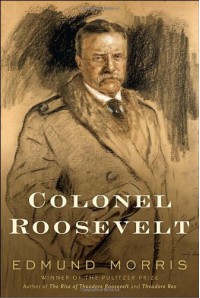Colonel Roosevelt
 This has to be the most epic biography of all time. There are no words that completely encapsulate Morris's achievement with his masterwork on the life of Roosevelt. Erudite, meticulously researched and contextualized, but without the "dryasdust" academic tone common to multivolume works or the panegyric tone reserved for childhood heros, Morris strikes a critical balance that legitimates Roosevelts inclusion among the greatest of presidents at Mt. Rushmore, Washington, Jefferson and Lincoln. This modern retrospective balances the historiography of the 1920s that canonized the legend of Roosevelt with the more circumspect and anti-imperialistic and sometimes downright anti-American reviews of the post-WWII era. The result is an analysis that is full of praise where it's due and legitimate criticism given weight by more historical hindsight than its predecessors could manage.
This has to be the most epic biography of all time. There are no words that completely encapsulate Morris's achievement with his masterwork on the life of Roosevelt. Erudite, meticulously researched and contextualized, but without the "dryasdust" academic tone common to multivolume works or the panegyric tone reserved for childhood heros, Morris strikes a critical balance that legitimates Roosevelts inclusion among the greatest of presidents at Mt. Rushmore, Washington, Jefferson and Lincoln. This modern retrospective balances the historiography of the 1920s that canonized the legend of Roosevelt with the more circumspect and anti-imperialistic and sometimes downright anti-American reviews of the post-WWII era. The result is an analysis that is full of praise where it's due and legitimate criticism given weight by more historical hindsight than its predecessors could manage.Filled with painstaking recreations of momentous personal and political moments, Morris manages to tread a fine line by driving his narrative with descriptive details that insert the reader directly into unfolding events and historical context that builds with the same skill of a brilliant novelist. Sure he takes some liberty with descriptions of the weather and sensory passages, but these passages heighten the sense of realism rather than detract from it. The result is a gripping story, taught with unfolding drama made all the more beautiful and engrossing because of the fatalism stemming from the reader's general impression of world history. What was fascinating for me was seeing how Roosevelt felt and reacted to major events like the First World War after he exits the pages of most modern history textbooks. There's so much more to tell and he remains an off-stage character of such import in these events that it seems downright criminal not to mention the intellectual and ideological role he played in the progressive reforms enacted by the Wilson administration, its reaction to foreign affairs and, surprisingly (for me at least), Wilson's eventual downfall and the US rejection of the Treaty of Versailles and the League of Nations. Morris cleverly and eloquently filled a historical niche I find absolutely fascinating in this last volume.
In fact, I found this volume much more riveting than the volume covering his presidency. Perhaps that has to do with sourcing. Whereas the second volume was constructed from a wealth of official documentation in addition to Roosevelt's continued prolific personal correspondence, this volume relied mainly on the latter and his historical, literary and political works as an explorer, naturalist, party ideologue and columnist. As a result, the narrative tends to feel less coldly professional and more warmly humanistic. Of course, it doesn't hurt that many of Roosevelt's most interesting experiences happened in his life after the presidency as the most famous man in the world. Roosevelt remained to his last days the quintessential American pioneer and frontiersman - a startlingly eloquent and direct advocate of equality and a fair-shake, whatever one might say of his rather bellicose Americanism. There's as much to be admired in Roosevelt's life as to be pitied and despised, especially his later devolution from highly effective mobilizer and accomplisher to the sad, shrill voice of opposition that squandered away much of his political capital and reputation as he was cast in the American mind as a relic of a bygone era refusing to relinquish his allotted moment of fame. Morris pulls no punches and the narrative does seem to show that Roosevelt's egotism grew in direct proportion to his age, but say what you will about his self-importance and his intolerance of views opposed to his own (especially when he considered them effeminate) - he remained true to his ideals at great emotional and financial cost and paid for his naively enthusiastic views about war and manhood with the life of his youngest son. It's hard not to blame him for the hardships imposed upon his sons and to Morris's credit, he reveals the pain of the father outliving the son without the absurd type of rationalization that stems from over-sympathizing with his subject. One does not shake the feeling that many of the problems he faced in later life were of his own creation - hazarding the perils of the Amazon while in his fifth century, ignoring the advice of his personal doctors or the newspaper headlines from Europe as he zealously wrote letters to place his sons on the front-lines of the abattoir that was the Western Front.
Or, perhaps, I'm just one of those tender men that prefers the safety of my reading chair more than the strenuous life that Roosevelt would have found pathetic and the costs he paid were simply the high costs of a life lived to the fullest. Either way, Morris's account of Teddy's life is instructive on a number of levels: philosophically, politically, intellectually, morally and historically. There are layers to peel apart here that are worth several re-readings. Apart from study, the works also provide probably the best window upon the human experience at the turn of the last century to be found in print.
Why aren't you reading it yet?



